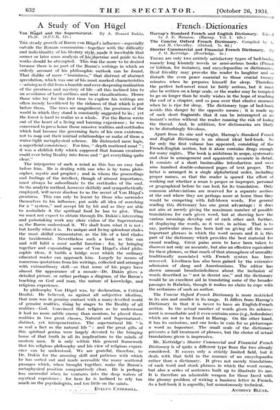French Dictionaries
Harrap's Standard French and English Dictionary. Edited by J. E. Mansion. (Harrap. Vol. I. 42s.) The Concise Oxford French Dictionary. Compiled by A, and M. Chevalley. (Oxford. 7s. 6d.)
Shorter Commercial and Financial French Dictionary. By J. 0. Kettridge. (Routledge. 66.) THERE are only two entirely satisfactory types of bed-books, namely long leisurely novels or semi-serious books (Proust or Gibbon, for instance), and encyclopaedias or dictionaries.
Real frivolity may proVoke the reader to laughter and so disturb the even peace essential to those crucial twenty minutes when he prepares himself for sleep. Therefore
the perfect bed-novel must be fairly serious, but it must also be written on a-large scale, or the reader may be tempted to go on longer than he really wishes in the hope of reaching the end of a chapter, and so pass over that elusive moment when he is ripe for sleep. The dictionary type of bed-book avoids this danger by the opposite means ; it is made up of such short fraginehts that it can be interrupted at an instant's notice without the reader running the risk of losing the thread. And, in addition; few' dictionaries are likely to be disturbingly frivolous.
Apart from its size and weight, Harrap's Standard French and English Dictionary is an almost ideal bed-book. So far only the first volume has appeared, consisting of the French-English section, but it alone contains drugs enough for many nights. The book is ambitious in scope, systematic and clear in arrangement and apparently accurate in detail.
It consists of a short businesslike introduction and over nine hundred double-columned pages of text proper. The latter is arranged in a single alphabetical order, including proper names, so that the reader is spared the effort of working out whether a noun is proper or improper, personal or geographical before he can look for its translation. Only common abbreviations are reserved for a separate section at the end where they are perhaps more at home than they would be competing with full-blown words. For general reading this dictionary has one great advantage : it does not aim at merely giving the maximum number of possible translations for each given word, but at showing how the various meanings develop out of each other and, further, at displaying the words, as it were, in action. That is to say, particular stress has been laid on giving all the most important phrases in which the word occurs and it is this part of the dictionary Which provides the best Material for casual reading. Great pains seem to have been taken to discover not only an accurate, but also an effective equivalent for these phrases, so that much of that atmosphere of unreality traditionally associated with French syntax has been removed. Liveliness has also been gained by' the extensive admission of slang and Americanisms. The editor has shown unusual broadmindedness about the inclusion of words described as not in decent use," and the dictionary would be an excellent aid in translating some of the broader passages in Rabelais, though it makes no claim to cope with the archaisms of such an author.
The Concise Oxford French Dictionary is more restricted
in its aim and smaller in its range. It differs from Harrap's Dictionary in that' it is- never to have an English-French
section. In the actual number of words given its achieve- ment is remarkable and it even contains some (e.g., bedondaine) which are not to be found in Harrap. On the other hand, it has its omissions, and one looks in vain for so picturesque a word as boyautant. The small scale of the dictionary
prevents a full treatment of phrases, but the choice of actual translations given is impressive.
Mr. Kettridge's Shorter Commercial and Financial French Dictionary is of quite a different type from the two already
considered. It covers only a strictly limited field, but it deals with that field in the manner of an encyclopaedia rather than a dictionary. It gives not merely translations of each word and stock phrases in which the word occurs, but also a series of sentences built up to illustrate its use. It is therefore an admirable weapon for those faced with the gloomy problem of writing a business letter in French. As a bed-book it is soporific, but monotonously technical..
ANTHONY BLincr.






















































 Previous page
Previous page